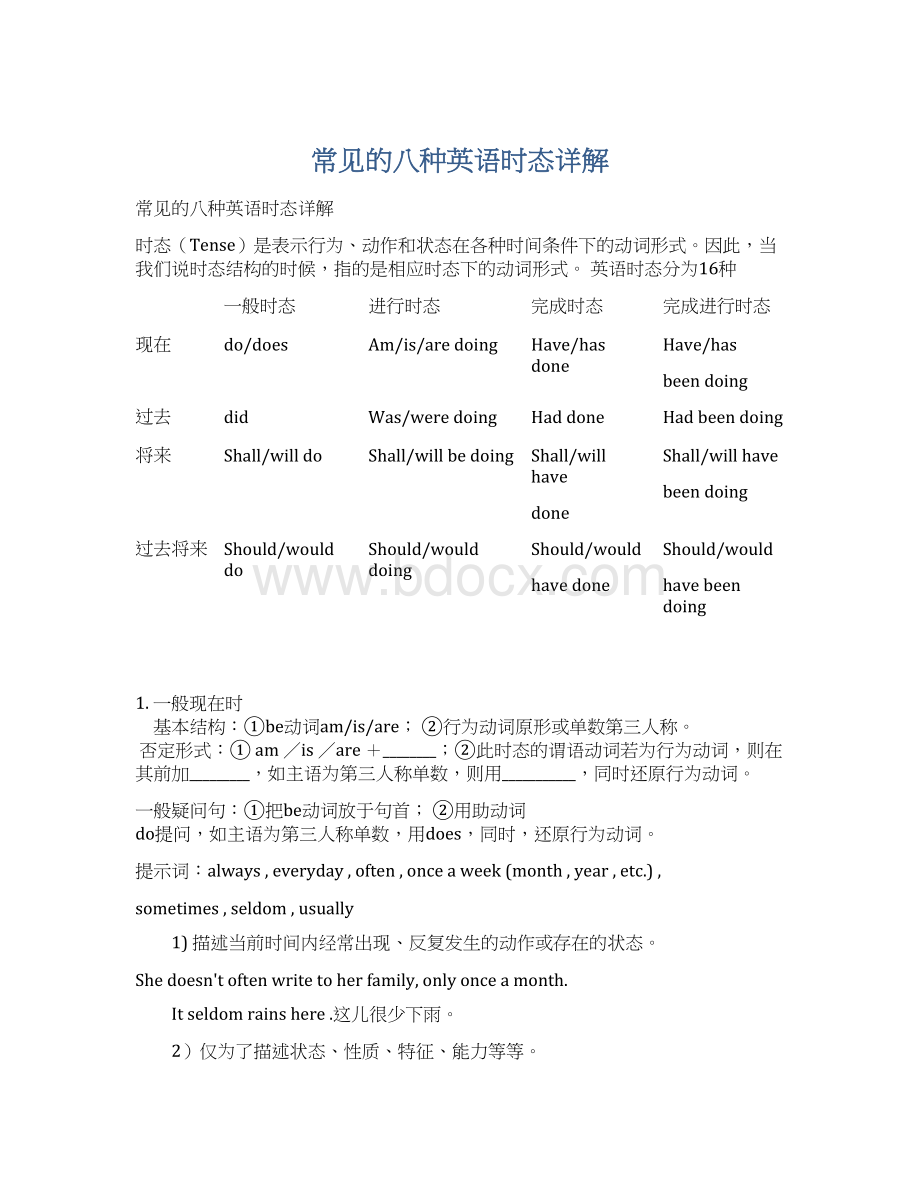常见的八种英语时态详解Word格式文档下载.docx
《常见的八种英语时态详解Word格式文档下载.docx》由会员分享,可在线阅读,更多相关《常见的八种英语时态详解Word格式文档下载.docx(11页珍藏版)》请在冰豆网上搜索。

Was/weredoing
Haddone
Hadbeendoing
将来
Shall/willdo
Shall/willbedoing
Shall/willhave
done
过去将来
Should/woulddo
Should/woulddoing
Should/would
havedone
Should/would
havebeendoing
1.一般现在时
基本结构:
①be动词am/is/are;
②行为动词原形或单数第三人称。
否定形式:
①am/is/are+________;
②此时态的谓语动词若为行为动词,则在其前加_________,如主语为第三人称单数,则用___________,同时还原行为动词。
一般疑问句:
①把be动词放于句首;
②用助动词do提问,如主语为第三人称单数,用does,同时,还原行为动词。
提示词:
always,everyday,often,onceaweek(month,year,etc.),
sometimes,seldom,usually
1)描述当前时间内经常出现、反复发生的动作或存在的状态。
Shedoesn'
toftenwritetoherfamily,onlyonceamonth.
Itseldomrainshere.这儿很少下雨。
2)仅为了描述状态、性质、特征、能力等等。
这里的目的是为了"
描述现阶段的动作或状态"
,其重点"
不是强调动作发生的时间、或进行的状态"
。
例如:
Hecanspeakfiveforeignlanguages.
ChangjiangRiverisoneofthelongestriversintheworld.
3)陈述客观事实、客观真理。
Theearthgoesaroundthesun.地球绕着太阳转。
4)根据英文语法规定,当主句的谓语动词是一般将来时,那么时间或条件状语从句的谓语动词只能用一般现在时来表示将来要发生的动作。
I'
lltellhimthenewswhenhecomesback.他回来时,我将告诉他这个消息。
Ifyoutakethejob,theywilltalkwithyouingreaterdetails.
5)现在时的特殊用法:
一般现在时表过去
1.用于某些动词(tell,say,hear,learn,gather等)表示不确定的过去时间。
如:
Ihearthathegotmarriedlastmonth.我听说他上个月结婚了。
Marysaysyoutoldhertocomeoverhere.玛丽说是你让她到这儿来的。
2.当要陈述一个客观事实时,有时即使有过去时间状语也可用一般现在时。
Thestoryissetinthesummerof1937.故事的背景是1937年夏天。
Thestorybeginsintheyear1937.故事开始于1937年。
练习
1)Healways_____(get)upearly.
2)Maryoften______(do)someshoppingonSundays
3).I’llgowithyouassoonasI_______(finish)myhomework.
4)Ifhe_______(come)here,Iwilltellyou
5)Theearth________(move)roundthesun.
6)Tomsometimes________(have)lunchatschool.
7)Lilyusually________(fly)kitesonweekends.
8)They________(be)neverlateforclass.
9)Light_________(travel)fasterthansound.
10)________Jim_________(speak)English?
2.一般过去时
1.定义:
表示过去某一点或某一段时间的动作或存在的状态。
2.提示词:
yesterday,thedaybeforeyesterday,justnow,lastweek/month/year,….ago,amomentago,afterthreedays,
lastterm,inSeptember,in2000,
3.动词过去式的构成:
1)v+ed2)e+ed
3)重读闭音节双写最后一个辅音字母再加ed。
planned,stopped,preferred,shopped
4)辅音加y结尾的把y改i再加ed。
Study,copy,carry,worry
5)不规则
1)Tom______(watch)TVlastnight.He_____(go)nowhere.
2)She______(give)meapresentlastChristmas.
3)Thestory______(happen)twoyearsago.
4)Itwasverycold,sohe____(put)onhiscoat.
5)Who_____(break)thewindowsjustnow?
6)I___(get)aletterfrommybrotheramomentago.
7)He______(try)tohelpuswhenwewereintrouble.
8)Thebedwas’tgood,butI______(sleep)verywell.
9)Whenshe______(hear)whatIsaid,she_____(become)angry.
10)They________(enjoy)themselveslastnight.
3.一般将来时
1.定义:
表示在将来某个时间要发生的动作或存在的状态,常与表示将来的时间状语连用。
2.提示词:
tomorrow,thedayaftertomorrow,nextweek/month/year,later,lateron,soon,in+一段时间
3.构成:
1)Shall用于第一人称,will适用任何人称,但第一人称疑问句一定用shall.
2)“be+不定式”:
表示命令、安排、倾向或必须、义务等。
SheistoplayJuliet.她扮演朱丽叶。
Youaretomakethenecessarychanges.你要做出必要的改变。
3)“beaboutto+不定式”:
表示即将发生的动作,有“即将”的意思,但不能和具体的时间状语连用。
Thepackageisabouttocomeunwrapped.那个包快散开了。
4)“begoing+不定式”:
表示按计划或安排打算去做某事,或表示有迹象表明要发生某事。
Mysister’sgoingtohaveababythissummer.我姐姐今年夏天要生孩子。
5)用现在进行时表示将来:
主要表示按规定或时间预计要发生的事。
ThestudentsareleavingonSunday.学生们星期日出发。
6)用一般现在时表示将来:
表示按规定或时间预计要发生的事。
Thetrainleavesat10:
04thisevening.火车今晚10:
04分开。
1)She_____(go)tothecinemawithherclassmatestomorrowevening.
2)We______(visit)ourteachernextSunday.
3)John__________(come)soon.
4)Therain_________(stop)lateron.
5)Myfather______(have)ameetinginafewdays.
6)What______we______(do)next?
7)_______I_______(wash)theclothestomorrow?
8)There_______(be)apartytomorrowevening.
9)I_________(notgo)thereifitrainstomorrow.
10)They_______(see)usassoonastheyreachhere.
4.现在进行时
1)“说话、写文章的当刻”正在发生的动作。
Theyarehavingafootballmatch.他们正在赛足球。
Sheiswritinghertermpaper.她正在写学期论文。
2)“现阶段”一直在进行的动作。
这种情况并不是说某个动作在说话的那会儿正在发生,而是说某个动作在当前一段时间内一直在进行着,或是重复地发生着。
HeispreparingforCETBandSix.他在为大学英语六级考试作准备。
Howareyougettingalongwithyournewjob?
你那份新工作干得怎么样?
3)表示说话人的情感,如:
赞许、批评;
喜欢、厌恶等。
这时的动作并不是正在发生或进行,而是表示经常性,相当于“一般现在时”所描述的情况。
Heisalwaysthinkingofothers,notofhimself.(表示赞许)
Oneofmyroommatesisconstantlyleavingthingsabout.(表示不满)
Somesellersareoftenknockingatourdoorandpromotingtheirproductstous.
4)表示在近期按计划或安排要发生的动作,用于这种情况仅限于少量的动词,如:
go,come,leave,arrive,see,have,lunch(吃午饭),return,dine(进餐,尤指晚餐),work,sleep,stay,play,do,wear(穿,戴)等。
例如